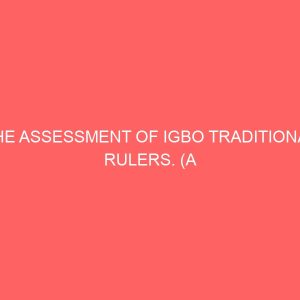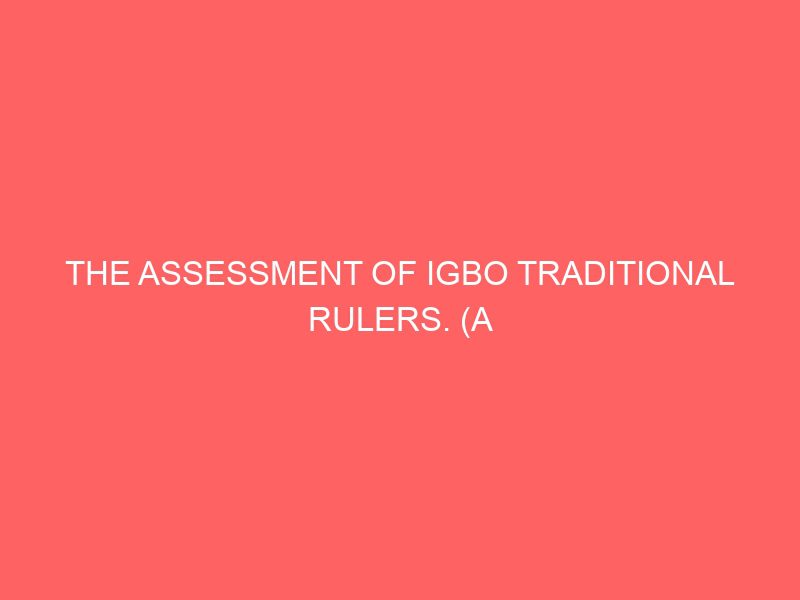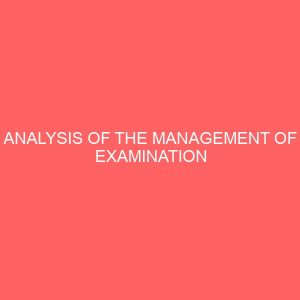THE ASSESSMENT OF IGBO TRADITIONAL RULERS. (A CASE STUDY OF AMANDUGBA AUTONOMOUS COMMUNITY IN ISU L.G.A. IMO STATE).
CHAPTER ONE
- INTRODUCTION
- BACKGROUND OF THE STUDY
For a proper analysis and understanding of the cultural and historical basis of Igbo Traditional Rulers, one has to accept to the fact that every society has its cultural heritage and value. Even in the developed world, modernization has not completely erased the cultural of the people in Nigeria, one of the cultural heritages in Igbo Traditional Rulers. It is obvious that, there has been an evolution through the years on places of Igbo Traditional Rulers and the roles they are expected to play in our national development. The above notwithstanding, Igbo Traditional Rulers in different peoples in the Nigeria colonial and post colonial Nigeria, the traditional ruler ships institution seems to be the most enduring pre-colonial institution that survived through forms of administration in modern Nigeria.
Traditional rulers or chieftaincy institutions in Nigeria have had a very chequered history. Before the advents of British colonial era, Igbo Traditional Rulers exercised political authority in their respective communities in varying degree as provided by their tradition and custom during the colonial era. The role of Igbo Traditional Rulers changed radically they became prime face rulers of their institution or communities under district commissioner, in the present Nigeria, the relevance and importance of Igbo Traditional Rulers have been fluctuating. It is against this backdrop that this work tends to analysis the salient roles performed by Igbo Traditional Rulers in national development and also to bring to limelight the relevance or otherwise of Igbo Traditional Rulers to nation building in the present day Nigeria with particular reference to Amandugba Autonomous Community in Isu Local Government Area of Imo state.
- STATEMENT OF PROBLEM
In any developing nation like Nigeria, the task of putting in places sustainable political, economic and social, cultural status. For development is not always the work of one and or a particular group of people. It involves the entire stakeholder governance of which Igbo Traditional Rulers are inclusive.
Igbo Traditional Rulers has prior to British institution in Nigeria been agents of development in their respective domains. They performed all functions needed for the nation building, following the institution into our political and economic system by the powers and relevance of these Igbo Traditional Rulersdimished substantially. They were related to the background in the scheme of things and some were used in the exploitation and manipulation of the indigenous people. This is one reason why some scholars had argued for the scrapping of the traditional ruler ship in the east brought about cultural debasement of our culture. It was believed that fellowing the independence of Nigeria, the Igbo Traditional Rulers would regain its prominence and contribute effectively in building of a new Nigeria, but this has not been as envisaged, as the fortune of these Igbo Traditional Rulers keeps on fluctuating from one regime to another.
There is also a continued debuted between and among scholars on the importance and relevance or otherwise of Igbo Traditional Rulers in Nigeria development. As a nation in the pipeline, the task of building a formidable Nigeria should not be the duty of modern institution of governance alone, there are roles which Igbo Traditional Rulers could play in nation building.
- OBJECTIVE OF THE STUDY
The purpose of this study is to bring to limelight of the efforts made by Igbo Traditional Rulers in ensuring strong and united Nigeria through some salient roles they performed in society the research will also identify and highlight some obstacles militating against the contribution of Igbo Traditional Rulers of traditional rulership, is still relevant to Nigeria development.
- RESEARCH QUESTION
- What are the role traditional rulers played in nation building?
- Do traditional rulers create any impact in nation building?
- Is there any other way the traditional rulers can contribute toward the nation building.
- Did the masses feel the impact made by traditional ruler in nation building?
- SCOPE OF THE STUDY
The purpose of this study is to bring to limelight of the efforts made by Igbo Traditional Rulers in ensuring strong and united Nigeria through some salient roles they performed in the society.
The research will also identify and highlight some obstacles militating against the contribution of Igbo Traditional Rulers of traditional rulership, is still relevant to Nigeria development.
The above issues among others are basic for the understanding of this research work.
- SIGNIFICANCE OF THE STUDY
To show the relevance of Igbo Traditional Rulers to the modern Nigeria society especially in this period of our democracy.
The study will equally stress how Igbo Traditional Rulers can effectively use their position to bring about social economic development.
This project will be useful to scholars who engage in African studies since it will provide first hand information about the contributions of Igbo Traditional Rulers in nation building with particular reference to Amandugba Autonomous Community in Isu
It can also serve as a useful material for undergraduates and post graduates alike.
- LIMITATION OF THE STUDY
The aim of this study is to state the impact made by the Igbo Traditional Rulers in making sure that there is strong and united Nigeria through smart role they play in the society the research also identify some problem encounter by the traditional rulers in nation building. It also states weather the Igbo Traditional Rulers relevant to the development of Nigeria.
- STATEMENT OF HYPOTHESIS
Hi: Igbo Traditional Rulers has played a unifying role in nation building.
Ho: Igbo Traditional Rulers has not played any unifying roles in nation building.
Hi: People believe that religion is a cog to the wheel of politics in Nigeria.
Ho: People do not believe that religion is a cog to the wheel of politics in Nigeria.
- DEFINITION OF TERMS
TRADITION: This the total of a people’s belief’s customs, values, ethnics, orientations, in the post which still exist in the present.
INSTITUTION: It is a relationship or behavioural pattern of importance of a community or society which has been in existence of a long time.
ADMINISTRATION: This is the management and directions of the affairs of government. It is the organization and direction of persons and resources to accomplish a desired end.
IGBO TRADITIONAL RULERS AND NATION BUILDING: It is the application and use of a people beliefs customs, values which the people have come to accept as valid and positive in the running of the affairs of their society in order to ensure stability, growth and the accomplishment of desired goals.
GOVERNMENT: It is the formal institution and processes through which building decision are made for a society and agency or machinery through which the desired of the state are realized.
₦2,500.00








Reviews
There are no reviews yet.